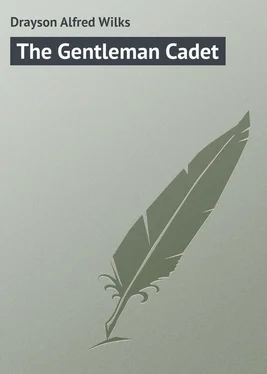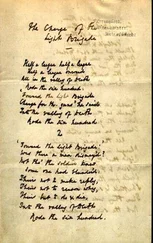Alfred Drayson - The Gentleman Cadet
Здесь есть возможность читать онлайн «Alfred Drayson - The Gentleman Cadet» — ознакомительный отрывок электронной книги совершенно бесплатно, а после прочтения отрывка купить полную версию. В некоторых случаях можно слушать аудио, скачать через торрент в формате fb2 и присутствует краткое содержание. Жанр: foreign_prose, foreign_children, foreign_language, на английском языке. Описание произведения, (предисловие) а так же отзывы посетителей доступны на портале библиотеки ЛибКат.
- Название:The Gentleman Cadet
- Автор:
- Жанр:
- Год:неизвестен
- ISBN:нет данных
- Рейтинг книги:3 / 5. Голосов: 1
-
Избранное:Добавить в избранное
- Отзывы:
-
Ваша оценка:
- 60
- 1
- 2
- 3
- 4
- 5
The Gentleman Cadet: краткое содержание, описание и аннотация
Предлагаем к чтению аннотацию, описание, краткое содержание или предисловие (зависит от того, что написал сам автор книги «The Gentleman Cadet»). Если вы не нашли необходимую информацию о книге — напишите в комментариях, мы постараемся отыскать её.
The Gentleman Cadet — читать онлайн ознакомительный отрывок
Ниже представлен текст книги, разбитый по страницам. Система сохранения места последней прочитанной страницы, позволяет с удобством читать онлайн бесплатно книгу «The Gentleman Cadet», без необходимости каждый раз заново искать на чём Вы остановились. Поставьте закладку, и сможете в любой момент перейти на страницу, на которой закончили чтение.
Интервал:
Закладка:
A change, however, has taken place in these things. Now it is no unusual thing for the visitor to Woolwich to see four or five young men at school lounging down the common arm in arm, each with his pipe in his mouth, jostling off the pavement an officer covered with medals, or puffing their tobacco-smoke in the faces of ladies, whom they almost force into the road, and eye in a half sneering, half patronising manner. To them a cadet is nothing superior in any way to themselves; an officer they imagine to be a man behind his time, and one to whom they could give lots of useful hints. Let people only wait till they become officers, and (so they believe) then they will show how things should be done.
Others, again, in the present day, stand on what they imagine their rights, and will not admit that any deference is due to either age, rank, or experience – a sentiment largely demonstrated during the reign of the Paris Commune, a sort of “down with everything that’s up” style, that is more dangerous to a country than are the armies of her enemies.
Thirty years ago such sentiments had little hold in England, and none whatever among those who were candidates for Woolwich, or who wore the coveted uniform of a gentleman cadet; and we cannot but think that much of that military devotion which so characterised every branch of the army during the earlier part of the present century was due to the esprit de corps felt by all officers at that time, when soldiering was not so much a business as an honourable profession. That men of the Anglo-Saxon race should ever fail in courage, or in a sense of duty, is not likely, but there is a marked difference between work done from a sense of duty and that done con amore ; and where discontent is not unknown, we too often find mere duty is most irksome.
During four months that I remained at Mr Hostler’s, previous to a brief vacation, I made very slow progress; it seemed to me that there was a disinclination on the part of the masters to push me forward. I was kept over and over again at the same things, whilst other boys were pushed on to more advanced subjects. I had obtained a reputation for being stupid and having no capacity for mathematics, and this case seemed an example of giving a dog a bad name, and you may as well hang him. The neglect with which I was treated produced its effect on me, for I failed to use all my powers to advance, as it seemed a useless effort on my part; so I only did as much as would save me from the whalebone cane, and this I often failed to escape.
I hailed with delight the day that I left Mr Hostler’s for a three weeks’ holiday, for I hoped I should never return, as I intended to explain to my father how matters were, and to get him either to send me to another school, or to withdraw me entirely from the proposed competition for Woolwich. I had a keen sense of the discredit that would attach to me if I went up for my examination and failed, for I knew slightly a boy near Salisbury, who had been prepared for Woolwich, had gone up to the Academy, and been, as it was termed, “spun.” Many persons who knew nothing of the difficulty of the examination, or were unacquainted with the fact that out of forty who went up for examination it was rare for more than twenty or twenty-five to be taken, yet pitied the friends of this boy on account of his “discreditable failure,” as they termed it. Believing that it was no question of probability, but a certainty, that I could not qualify for my examination, I considered it would be more prudent to withdraw under some excuse, rather than go up and fail. I was also assured by several boys that Mr Hostler would not allow me to go up unless he was tolerably certain I should pass, as it would bring discredit on his school if I failed.
It was late in the evening when I reached my father’s lodge, and was welcomed by all my relatives. The change that had taken place in me was marked, and was noticed by all. I was thinner, and the care and thought of the past four months had given me an aged appearance, that made me look a year older than I was. I could scarcely conceal my feelings as my sisters hoped I was getting on splendidly, and would soon be an engineer, like Howard. To enter into all the details of my difficulties with them would, I knew, be useless, and so I avoided answering them, and made up my mind to wait till I could have a quiet talk with my father, and explain matters to him.
After dinner that evening I found my opportunity of speaking to my father when we were alone. I was most eager to open my heart to him, and let him know how things really stood. Without any preface I suddenly said, “I want to tell you, there’s no possible chance of my passing for a cadet.”
“No chance! What do you mean? Why, it’s nearly ten months to your examination! Don’t you mean to try?”
“I may try all I can, and yet it’s impossible; it would take me two years to get into the class that goes up for examination.”
“Mr Hostler thinks differently, Bob, for he says that he hopes you will pass, if you will work; but that up to the present time you have been very idle.”
I listened with astonishment to my father’s remarks, and could hardly believe it possible that Mr Hostler had written such words. My doubts, however, were soon removed, by the production of Mr Hostler’s letter, in which were the very words quoted. I knew that what I had stated was correct, and that Mr Hostler knew, even better than I did, that there was no chance of my success; but at the time I had no idea of the reason for his sending such a letter to my father. It was, I found, the intention to send me back to Hostler’s at the termination of my three weeks’ vacation, and I began to count the days and hours of liberty previous to that, to me, unpleasant period.
On the following morning I received an invitation from Howard, asking me to go over and pass a few days with him, and, having obtained my father’s consent, I started for his lodgings, which were at a farm-house near Lyndhurst.
Howard was now to me even a greater hero than he had formerly appeared. I looked on him as one who had passed a distinguished career at Woolwich, and had also been abroad, and I felt somewhat afraid of him now that I knew how much he had done. He was, however, so kind and friendly that I was soon at my ease, and as we sat at our tête-à-tête dinner I found myself telling him all my disappointments, hopes, and fears at Mr Hostler’s, and my difficulties as regarded the future.
Howard seemed much amused at all I told him, and said that the first thing he must teach me was to be a good “mill,” – that meant, how to use my fists. He did not mean to bother me with work, as he believed I wanted rest more than anything; but he promised to write to Hostler, and ask him to push me on, and he thought that, although it was difficult, yet it was by no means impossible I might pass.
On the following morning, soon after breakfast, Howard produced a pair of boxing-gloves, and, taking a seat on a chair, gave me instruction in what he called “the noble art of self-defence.” He first showed me how to stand, how to raise and hold my fists, how to strike out and make the foot and hand work together. He pointed out the danger of an open guard by giving me light taps in the face, and then explained how to guard them.
“We’ll have an hour a day at this fun,” he said, “while you are here, and I’ll back you to lick Fraser when you go back to Woolwich. There’s nothing that can’t be done by thought and work.”
During the week I passed with Howard I changed from a condition of despondency to one of Hope. I learnt from him the power to be derived from thought and work. He explained to me his own difficulties, and how he had overcome them, and encouraged me by saying that, although I was backward, he believed I had brains enough to come to the front after all. By constant practice I had become, as he said, quite a “dab” with my fists, and ought to hold my own with heavier weights than myself. “Don’t you ever seek a fight,” he advised, “if you are even sure to win, because that’s bad style; but, if a boy tries to bully you, never avoid a fight, and you’ll soon find you’ll lead an easier life, even though you get licked.”
Читать дальшеИнтервал:
Закладка:
Похожие книги на «The Gentleman Cadet»
Представляем Вашему вниманию похожие книги на «The Gentleman Cadet» списком для выбора. Мы отобрали схожую по названию и смыслу литературу в надежде предоставить читателям больше вариантов отыскать новые, интересные, ещё непрочитанные произведения.
Обсуждение, отзывы о книге «The Gentleman Cadet» и просто собственные мнения читателей. Оставьте ваши комментарии, напишите, что Вы думаете о произведении, его смысле или главных героях. Укажите что конкретно понравилось, а что нет, и почему Вы так считаете.












